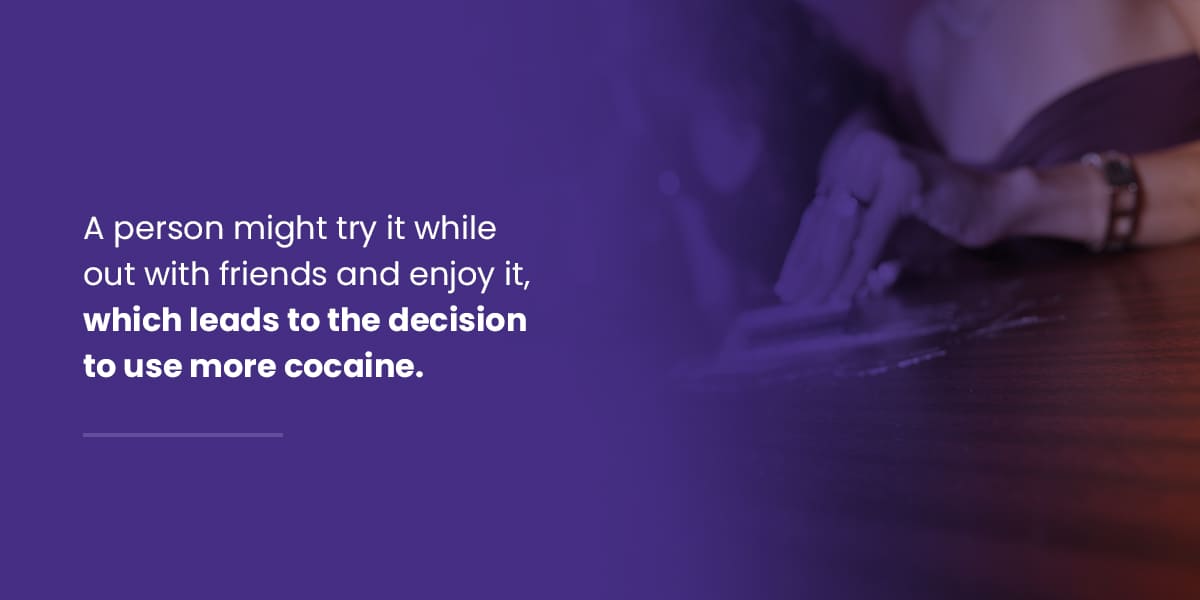When you use cocaine, whether it’s the first time or one of many times, it’s easy to feel like you have control over your consumption. However, this false belief is what leads to a dangerous cocaine addiction cycle. If you engage in casual cocaine use, you may be more addicted to it than you think, but there is hope in overcoming addiction with an integrative, holistic treatment program.
Table of Contents
- I Only Do Cocaine on Weekends – Am I Addicted?
- The Long-Term Impact of Prolonged Cocaine Use on the Weekends
- Why Is Cocaine So Addictive?
- The Cocaine Addiction Cycle
- A Hidden Danger: High-Functioning Cocaine Addiction
- Signs of Stimulant Use Disorder
- Recover From Your Cocaine Addiction at The Sanctuary at Sedona
I Only Do Cocaine on Weekends — Am I Addicted?
Cocaine has long been glamorized in media and popular culture. Because of this, we have a more casual attitude towards it than we do towards other drugs. Just a casual line or two after a few drinks on a Friday isn’t going to kill us, right?
As it turns out, perceptions of what classifies as “recreational” use are often quite skewed, and users are often more addicted to cocaine than they initially realize. According to the founder of the Global Drugs Survey, Dr. Adam Winstock, it’s not healthy to use cocaine every weekend, and it can’t be considered as average or casual use.
Learn About Our Cocaine Addiction Program
The Long-Term Impact of Prolonged Cocaine Use on the Weekends
Using cocaine every weekend over a prolonged period of time can have long-term negative effects on your health. Snorting or “sniffing” cocaine can cause damage to the tissue in the nose, and smoking it can lead to respiratory failure. Injecting cocaine can lead to abscesses and infectious diseases. Other long-term effects of cocaine use include the following:
- Tooth decay
- Malnutrition and weight loss
- Auditory hallucinations
- Exhaustion
- Confusion
- Disorientation
- Apathy
- Irritability and other mood changes
- High blood pressure
- Stroke
- Heart attack
- Permanent damage to blood vessels in the brain and heart
- Reproductive damage
- Male and female infertility
- Psychosis
- Delirium
- Clinical depression
Doing cocaine every weekend may seem like temporary fun, but weekends will start to add up and lead to dangerous long-term effects. A casual cocaine habit can quickly turn into a life-threatening addiction.
Why Is Cocaine So Addictive?
You know how the story goes: you head out on a Friday night to blow off some steam, telling yourself you’ll steer clear of cocaine every weekend, but after a few drinks the justifications start pouring in. “Just a line won’t hurt,” or “I deserve it after a long week” — the excuses are endless, but the behavior is the same. And that one line turns into many more, eventually forming a pattern. Before you know it, you may find yourself doing cocaine on weekdays, by yourself or without understanding why.
Addiction is progressive. With repeated or weekly cocaine use, your tolerance increases, meaning your body needs more of it to get high. And because of the profound effects of cocaine on the brain, the likelihood of becoming addicted to cocaine is considerable.
The Cocaine Addiction Cycle
Cocaine users fall into a cyclic use pattern quickly, and this addiction cycle is divided into five stages. When someone uses cocaine, they begin to go through the five stages of cocaine addiction which include cocaine consumption, an early crash, a late crash, an improved mood between binges and the final stage, craving cocaine.
Cocaine Consumption
Cocaine addiction can start with even the smallest amount of cocaine. A person might try it while out with friends and enjoy it, which leads to the decision to use more cocaine. Eventually, they might try to rationalize using cocaine and begin to experience cravings more often. A cocaine user will build a tolerance and need larger amounts of the drug to feel the “high” that they are seeking, leading to binging on cocaine and experiencing the negative side effects that come with it.
The Early Crash
The second stage of the cocaine addiction cycle begins after a person binges on cocaine. They will begin to experience intense anxiety and search for ways to obtain more cocaine. When they can’t obtain more cocaine, they will often search for relief in other substances such as alcohol, marijuana or sedatives. They will also experience decreased appetite, high body temperature, time distortion and remorse for their cocaine use. This stage of the cycle can last one to four hours.
The Late Crash
The late crash stage of the cocaine addiction cycle begins about three to five hours after a person uses cocaine. During this stage, they will feel deep remorse, shame and depression. Their appetite will increase and they may feel tired. During this stage, they may consider running away, committing suicide or entering treatment.
An Improved Mood Between Binges
Approximately one to two days after a cocaine binge, a person’s mood will increase and they will begin to develop a positive outlook on life. They will feel relieved that they made it through their binge and confident that they are able to handle their cocaine use. This confidence can lead to relapse because it gives the false impression that they can use cocaine without problems.
During this stage, a person will begin to feel good for a while with normal sleeping patterns and increased energy levels. However, these feelings will soon shift to feelings of restlessness and emptiness. They will eventually start to crave cocaine again, but they will also feel like they have control and have overcome their problem with cocaine use. In this stage, a person can make one of two choices — either seek treatment for their cocaine use, or continue to use cocaine.
Craving and Seeking Cocaine
During the final stage of the cocaine addiction cycle, a person’s cravings for cocaine will intensify, and they will begin to seek the drug. Environment, thoughts, friends and other factors can trigger cravings and lead to cocaine-seeking behavior. A person in this stage of the cycle will often feel panic and take desperate measures to obtain cocaine, such as calling friends in the middle of the night or driving long hours to purchase the drug.
During this stage, a person will also experience pre-cocaine jitters in anticipation of obtaining cocaine. These jitters can cause dry mouth, sweaty palms, a racing pulse and gastrointestinal hypermotility. A person will also rationalize their cocaine use during this stage, telling themselves that they will only use a small amount or that this will be the last time they use cocaine. If they are able to find and obtain cocaine, the person will begin stage one again and continue the cocaine addiction cycle.
A Hidden Danger: High-Functioning Cocaine Addiction
One of the dangers of high-functioning addiction is that it’s harder to see. We tell ourselves that if we’re going to work on time, paying our bills and living in a nice home, we can’t possibly be addicted to cocaine. But the truth is that addiction lies not in how often you use, but in your relationship with the substance. To determine if you might be a high-functioning cocaine user, ask yourself the following questions:
- Have you done something unsafe or something you regret while on cocaine?
- Have your cocaine purchases affected your budget?
- Do you look forward to the next time you’ll do coke?
- Has a partner, friend or family member expressed concern about your drug use?
- Do you hide your cocaine use from non-using people in your life?
If so, you’ve already experienced some of the consequences of cocaine addiction.
Signs of Stimulant Use Disorder
According to the Diagnostic and Statistical Manual of Mental Disorders (DSM–5), someone who experiences two or more of the following problems within a year is considered to have stimulant use disorder:
- Using more than you intend to
- Failing at your attempts to cut back or quit
- Spending a significant amount of time doing drugs
- Forgoing other activities in favor of doing coke
- Craving cocaine
- Failing to meet your responsibilities at home or at work due to your coke use
- Continuing your drug use despite its negative impacts on your life
- Using cocaine in a physically dangerous way
- Using coke despite its toll on your mood or mental health
- Developing a tolerance to cocaine
- Withdrawing from coke when you don’t use it for a period of time
If you notice any of these signs of cocaine addiction or cocaine withdrawal symptoms, it may be time to seek help and pursue recovery. There’s no way around it – cocaine ruins lives. Even if you feel you’re in control of your use now, ask yourself if using is worth it knowing you can easily lose control?
Recover From Your Cocaine Addiction at The Sanctuary at Sedona
At The Sanctuary at Sedona, we understand how inescapable cocaine addiction can feel, even when it’s wreaking havoc on your mind, body, spirit and the relationships you value most. Our integrative treatment program offers an entirely new paradigm in cocaine addiction treatment, using discoveries in epigenetics and neurogenesis along with deeply transformative holistic techniques to enable you to fully recover and be well.
To learn more about how The Sanctuary can help with cocaine addiction, contact us online or call us at (866) 748-4894. Our staff are experts in holistic and clinical care, and we will treat you like family as we support you through the recovery process.
He is the Founder, Administrator, Counselor at the Sanctuary at Sedona. He has a BA in Political Science and is currently Senior teaching staff at Four Winds Society, an international school of energy medicine. His credentials also include being an Ordained Minister; a Certified Shamanic Breathwork® Facilitator; a Founding Member Society for Shamanic Practitioners; a Member of Association for Comprehensive Energy Psychology; a Member of the National Institute for Holistic Addiction Studies. [email protected]



